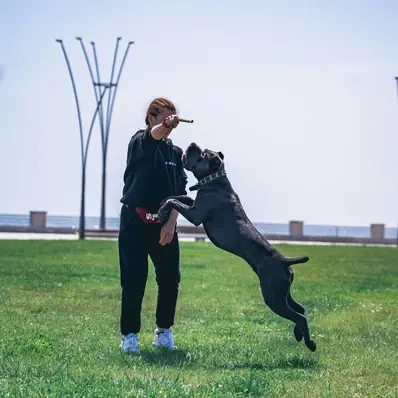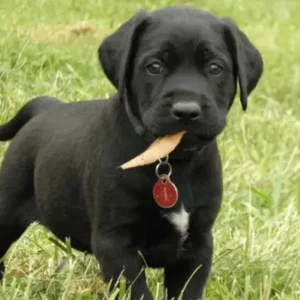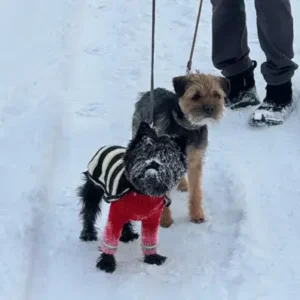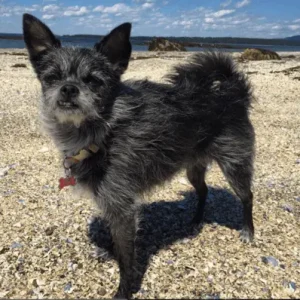Cane Corso History/Origin
The Cane Corso belongs to a subcategory of working breeds called mollosers. These dogs are named after the Molossi, an ancient Greek tribe known for breeding large or giant breeds of the Mastiff-type dogs. During the Roman Empire, legions brought these mollosers to Italy and bred them with native breeds. The resulting dogs became the ancestors of the modern Cane Corso and the larger Neapolitan Mastiff.
Originally, Cani Corsi was used in warfare. Known as ‘prefer,’ these fearless purebred dogs charged enemy lines with buckets of flaming oil strapped to their backs. These early Corsi were likely larger and more lumbering than today’s agile version.
After the fall of the Western Roman Empire in the fifth century, Corsi adapted to civilian roles. They were used for wild boar hunting, farming, livestock droving, and guarding farmsteads. By the mid-20th century, the breed was nearly extinct.
Despite this, some specimens survived in rural Italy. In the 1970s, Italian enthusiasts worked to revive the breed. The Society Amorati Cane Corso was formed in 1983. By the following decade, Corsi was being exhibited in European dog shows. The first Cane Corso was imported to America in 1988. The American Kennel Club recognized the breed in 2010 under Working Group.
- Origin
The Corso, a descendant of Roman war dogs, is more lightly built than its cousin, the Neapolitan Mastiff. It was bred for hunting, guarding property, and farm work. “Cane” comes from the Latin word for dog, “canis.” “Corso” may derive from “cohors,” meaning bodyguard, or “corsus,” an old Italian word for sturdy or robust.
The Society Amatori Cane Corso was key in the breed’s revival. The Federation Cynologique Internationale recognized the breed in 1996 according to its breed standard. The International Cane Corso Association was established in 1993. The Cane Corso Association of America now governs the breed in the U.S.
Neapolitan Mastiff- Source: AKC.org
Cane Corso Personality
The Cane Corso is one of the dog breeds that is a robust and powerful , exudes confidence and intelligence. They are known for their loyalty and protective nature, making them excellent guard dogs. Cane Corsos are typically affectionate with their family members, forming strong bonds and showing a gentle, loving side.
They are generally reserved with strangers, which aligns with their protective instincts. Their calm demeanor at home contrasts with their alertness in new situations, showcasing their versatility as family companions and guardians.
- Cane Corso Temperament
The Cane Corso has a vigorous temperament. This can be both good and bad. They are assertive and can be dominant, requiring a firm and consistent leader to manage their strong-willed nature. While they are typically good with children, their size and strength mean they should be supervised during interactions to prevent accidental injuries.
The sensitive Cane Corso responds well to positive reinforcement for good behavior and firm, consistent corrections for misbehavior.
- Potential Challenges
Owning a Cane Corso comes with certain challenges, primarily due to its size, strength, and protective instincts. They require consistent training and socialization from a young age to ensure they are well-behaved and manageable. Without proper guidance, their dominant and protective traits can lead to aggressive behavior, particularly towards strangers or other animals.
The dog should meet many different people and experience various sights and sounds before it is four months old. They need regular mental and physical stimulation to prevent boredom and destructive behavior. Additionally, their sheer size and energy levels mean they are best suited for owners who have the time, space, and experience to handle such a powerful breed.
Cane Corso Physical Appearance
The Cane Corso is a large, robust dog with a rectangular build, featuring a broad head and muscular, slightly arched neck. They have brown eyes, a brown or black nose, and a short coat that thickens in winter.
- Cane Corso Size
The Cane Corso is a large, muscular breed. Males stand 25 to 27.5 inches tall at the withers, while females are 23.5 to 26 inches. Cane Corso weight, proportionate to their height, typically ranges from 90 to 120 pounds.
- Cane Corso Coat color
The Cane Corso has a short, double-layered coat. The length of the undercoat varies depending on the climate in which the dog resides. The breed has a deep, broad muzzle and comes in various colors, including black, blue, red, and shades of gray and fawn.
Cane Corso Gender Differences
Females of the breed typically exhibit a slightly smaller stature compared to males, though the only difference lies in their size. Both genders share the same distinctive features and temperament traits characteristic of the breed, with no significant variations in behavior or personality based on gender.
However, it’s important to note that these differences in size should not lead to gender stereotyping. Individual variations within each gender are more significant than any generalized distinctions based on gender.
Cane Corso Feed/Nutrition
Recommended daily feeding amounts for a Cane Corso typically range from 4 to 5 cups of high-quality dry food. However, the specific amount your adult dog requires depends on factors such as size, age, metabolism, and activity level.
Just like people, dogs are individuals with varying needs, so a highly active dog may need more food than a less active one. You can also include broccoli in your dog’s diet, as it’s a healthy, low-calorie vegetable that provides essential vitamins and fiber.
The quality of the dog food also matters; better-quality food provides more nourishment, requiring less to satisfy your dog’s needs. To keep your Corso in good shape, measure their food and feed them twice a day instead of leaving food out continuously.
Cane Corso Health Problems
Cane Corsos are usually healthy, but like all dogs, they can have health issues. Not all Corsos will get these problems, but it’s good to know about them if you want this breed.
- Hip Dysplasia and Elbow Dysplasia: Hip dysplasia and elbow dysplasia are conditions where the hip and elbow joints, respectively, don’t fit properly, causing discomfort and mobility issues in Cane Corsos. Symptoms include pain, stiffness, lameness, and difficulty rising. To prevent these conditions, maintain a healthy weight, avoid excessive high-impact exercise, provide a balanced diet, and seek early veterinary intervention for management strategies such as weight control and appropriate exercise routines.
- Canine Gastric Torsion: Also known as Bloat is a life-threatening condition where the stomach twists, cutting off blood supply and causing rapid gas buildup. Symptoms of bloat in Cane Corsos include a swollen or distended abdomen, restlessness, unproductive attempts to vomit, drooling, and signs of distress or pain. Prevent bloat by feeding multiple small meals throughout the day and being familiar with the symptoms to seek immediate veterinary care if necessary.
- Progressive Retinal Atrophy: PRA is an inherited disorder that causes gradual deterioration of the retina, eventually leading to blindness. Symptoms of PRA in Cane Corsos include night blindness, dilated pupils, and gradual loss of vision, eventually leading to complete blindness. Regular eye examinations by a veterinary ophthalmologist can help detect PRA early.
- Idiopathic epilepsy: Idiopathic epilepsy in Cane Corso is a neurological disorder causing recurrent seizures without a known cause. In Cane Corsos, idiopathic epilepsy typically manifests around the age of 2 years, although it can appear as early as 9 months or as late as 5 years. While its exact origins are unclear, it’s often managed with medication and regular veterinary check-ups to ensure the dog’s well-being. With proper care, many affected Corsos can lead fulfilling lives despite this condition.
Cane Corso Care and Grooming
Caring for a Cane Corso dog involves plenty of physical activity, such as brisk walks or jogs of at least a mile in the morning and evening. Their short coat sheds heavily twice a year, necessitating regular grooming with weekly baths and brushing, establishing grooming routines early on. Nail trimming and ear cleaning should also be incorporated into their regular grooming regimen to maintain overall health.
These practices provide opportunities to check for any signs of potential health issues, facilitating early detection and treatment. Additionally, accustom your Corso to bathing from a young age, teaching the command “Bath” for a positive experience.
Brushing your Corso’s teeth several times a week helps prevent tartar buildup and gum disease, ensuring fresh breath and dental health. Crate training your dog also creates a safe space for them, aiding in house training and providing them with a place to relax.
Cane Corso Rescue Groups
Some Corsos, acquired without adequate understanding of the responsibilities involved in their care or surrendered due to changing circumstances, need adoption or fostering. When considering adding a Corso to your family, it’s crucial to seek reputable breeders or adoption agencies. This ensures responsible breeding practices are followed. Additionally, it ensures proper placement of dogs in need of homes.
Cane Corso Price
The price of a Cane Corso typically ranges from $1,500 to $5,500, depending on factors such as breeder reputation, lineage, and location.
Ensure you research reputable Cane Corso breeders or adoption agencies to find a healthy and well-socialized Corso. Take the time to inquire about the dog’s background, health history, and temperament to ensure a suitable cane corso puppy for your lifestyle and needs.
Interesting Facts
- They have appeared in a famous TV series “ Games of Thrones”.
Games of Thrones- Source: The Independent
- Cane Corso was featured in a Breed judging show in 2023.
Best For
Cane Corsos are perfect pets for experienced dog owners who lead active lifestyles and are dedicated to providing daily exercise and mental stimulation. However, prospective owners should be prepared to invest time and effort into grooming, training, and socialization to ensure a well-balanced and well-behaved Corso. These dogs are not for someone who fears large dogs.
Top Names
| Male Cane Corso Names | Female Cane Corso Names |
| Rocky | Bella |
| Max | Daisy |
| Duke | Luna |
| Thor | Sadie |
| Zeus | Rosie |









 Neapolitan Mastiff- Source:
Neapolitan Mastiff- Source: 

 Black Cane Corso- Source:
Black Cane Corso- Source:  Brindle Cane Corso- Source:
Brindle Cane Corso- Source:  Brown Cane Corso- Source:
Brown Cane Corso- Source: 
 Games of Thrones- Source:
Games of Thrones- Source: 






